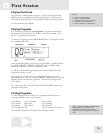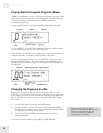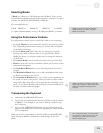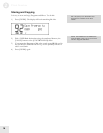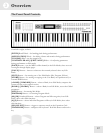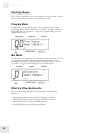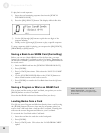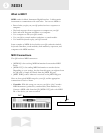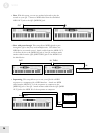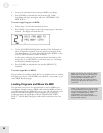
4 Expansion Cards
21
PCMCIA Expansion Cards
If you want more Sounds (samples), Programs, Mixes, or Sequences, all
you have to do is insert the appropriate card into the QS’s [PCMCIA
EXPANSION SLOT].
There are three kinds of expansion cards that you can use:
• QCards are a series of excellent ROM (read-only memory) cards
developed by Alesis. Each contains 8MB of professional
uncompressed PCM samples plus Programs and Mixes designed to
take full advantage of them. The cards available are Classical,
Sanctuary, Vintage Keyboards, Vintage Synthesizers, HipHop,
EuroDance, Latin, Stereo Classical Piano, and Stereo Jazz Piano. You
can get these at your Alesis dealer.
• SRAM cards provide additional storage for Programs and Mixes. A
512K SRAM card can hold eight Banks of Programs and Mixes. You
can edit these as you wish. Many different SRAM cards from 256K to
8 Megabytes are supported; just make sure they are 5-volt read/write
only, and have an access time of 120 nanoseconds or faster.
• Flash cards provide additional sample memory that you can fill with
your own sounds using a computer! The QS can accommodate 2MB,
4MB, and 8MB flash cards (larger cards will work, but only the first
8MB will be utilized by the QS). Using Alesis’ Sound Bridge software
on your PC or Mac, you can download samples into the Flash card
through MIDI. Flash cards must be Type 1 PC cards (PCMCIA), and
must be AMD-C series or -D series FLASH or compatible, with an
access time of 120ns or faster.
Playing Card Sounds
To play the sounds on an expansion card, enter Mix or Program mode
and use the [BANK] buttons to select the Card Bank. Up to 8 Card
Banks can be recognized.
Playing Card Sequences
Several of the Alesis QCards come with their own demonstration
sequences. In addition, you can store your own MIDI sequences to RAM
or FLASH cards using a computer and Alesis’ free Sound Bridge
software.
TIP: If you own a Q
-
Card, you can get
additional sound banks to go with that Q-
Card on the Alesis website.



